Anti social housing

Sustainable Energy Ireland's House of Tomorrow grant aid scheme has been successful in driving up standards in Irish residential building. Why, then, ask Construct Ireland’s Jason Walsh and Jeff Colley, are the residents in most need of the economic benefits brought by the scheme being left out?
The benefits of low-energy consumption in housing are well known. In light of ever increasing fuel costs and the spectre of carbon taxation, more and more householders are looking at home heating and other energy requirements that can be met by using a combination of energy conservation, along with renewable, low cost and even free energy sources.
In simple economic terms what is important in the private sector is doubly important for public housing schemes which, as a rule, exist to serve lower income families and individuals. From this perspective, the environmental argument for better building needn't even come into it: clearly, rising fuel costs are most significant for those with the lowest household incomes. As social housing is set aside to meet social and economic need, it is therefore only sensible that social housing should have low energy use requirements.
This seems to be the view of Ireland’s closest neighbours, the UK—which is certainly not renowned for being proactive in sustainable building. EcoHomes is an environmental rating tool developed by the Building Research Establishment, which rates homes base on an aggregate of 27 parameters including proximity to public transport, thermal performance, environmental impact of materials, use of renewables, CO2 emissions to name but a few. All social housing built through the Housing Corporation or the English Partnership in Britain, and the Department for Social Development in Northern Ireland, must achieve a “Very Good” EcoHomes rating to qualify for funding, while social housing that achieves an “Excellent” EcoHomes rating gets additional funding. The scale of this is impressive; the Housing Corporation, for instance, funds the construction of roughly 35,000 homes per annum in England alone. But it doesn’t end there, as Andrew Eagles, Sustainability Manager with the Housing Corporation explains:
“[Housing] associations are eligible to receive grants of up to £50,000 for renewable energy installations, including solar thermal and wind turbines. Furthermore, as we have classed this funding as ‘other public subsidy’, it is available in addition to our own grant funding, as opposed to being deducted from it."Click here to read original PDF
It is disappointing, therefore, that our Department of the Environment has decided that grant aid delivered by Sustainable Energy Ireland should be deducted from the funding allocated by the department to local authorities and housing associations developing social housing.
Social housing need in Ireland is great and most commentators agree that not enough is being built. Whatever the case, 2005 saw 6,000 residences built in the sector, including 1,300 by voluntary housing associations. Had every one of these been designed to meet sustainable standards, not only would there be major benefit to the residents, but it would also surely have been a serious step toward renewing Ireland's housing stock with modern, future-proofed dwellings.
In order for that to be achieved, a level playing field is called for. However, at present this is far from the case.
On May 5, 2006 Green party TD Ciarán Cuffe submitted a question in the Dåil: "To ask the Minister for the Environment, Heritage and Local Government if housing construction schemes which received funding from his Department but also qualified for funding for energy efficiency from Sustainable Energy Ireland have had money deducted from their initial Department funding."
Noel Ahern, Minister of State at the Department of the Environment, Heritage and Local Government responded: "The setting of budget costs by my Department for the construction of social housing schemes involve adjustments of funding levels to eliminate duplication of funding sources should there be cases where funding is provided by Sustainable Energy Ireland."
In plain English, Ahern is saying that the Department of the Environment is already funding the building of social housing and that, therefore, use of further government money to meet the shortfall is unacceptable.
In Ireland today, voluntary and local authority housing is 95 per cent funded by central government. That is to say, 95 per cent of the cost of a housing development is met by the Department of the Environment. The local authority or voluntary housing association must therefore make up the remaining five per cent by other means. Department of the Environment policy forbids duplication of public funding.

With memories of the Ballymun tower blocks still fresh in the memory, are we doing enough to ensure current social housing doesn't suffer a similar fate? Ecohomes social housing includes Drum Housing Association's Way of the Sun development at Whitehill
The benefits of low-energy consumption in housing are well known. In light of ever increasing fuel costs and the spectre of carbon taxation, more and more householders are looking at home heating and other energy requirements that can be met by using a combination of energy conservation, along with renewable, low cost and even free energy sources.
Chris White of the Irish Council for Social Housing says it is this policy that is unacceptable, rather than duplication of funding sources: "House of Tomorrow funding is available to everyone apart from housing associations. If a House of Tomorrow grant is given, the Department of the Environment claws it back, requiring the housing association to pay its five per cent," he explains.
"Fair enough, but that's a different regime," says White. "The fundamental point is that the grants are available to everyone except housing associations. Housing associations should be encouraged to develop.
"Our perspective is one of fuel poverty. The vast majority of people we house are on a tiny income. 85 per cent earn less than €15,000 per year," he says. "The key question is, can SEI funding be considered the five per cent?"
According to White, current Irish policy favours owner-occupancy: "The government offers huge tax breaks for private housing and is putting loads more money into 'affordable' housing as opposed to social housing," he says. "From a housing needs perspective, the reason we have a crisis is because we have one of the lowest social housing compliments in the EU 25."
Nevertheless, the Department of the Environment's position is not an illogical one. The question is whether or not it's the right one.
At present, the department is clear that funding from the exchequer beyond the allotted 95 per cent is forbidden. Although White questions the department's definition of House of Tomorrow grants, which are partially obtained from EU structural funds, obviously both the department's core funding and the House of Tomorrow funding are both controlled from government coffers.
However, should an exception not be made for funding social housing which meets sustainability standards? After all, not only will this have a direct economic benefit for those living close to the fringes of society, but it would also mitigate the need to supply fuel allowances, thus saving government money in the long run, not to mention making a contribution to reducing Ireland's carbon output should supranational pollution taxation come about, as seems likely.
Anti-social housing
John Burke, manager of Tullamore Housing Association in County Offaly, explains that the Department of the Environment has told his organisation that if they are eligible for the House of Tomorrow grant, the same amount of funding will be reduced from the department's primary grant aid: "Private house—builders and so on—can apply for the grant, as can individual home owners, so we thought 'why leave out the voluntary sector?'," he says.
Tullamore Housing Association is a small but growing group helping to meet housing needs in a rural area: "At present, we have ten units for a social mix of residents," says Burke. Tullamore's application to SEI under the House of Tomorrow scheme was for the introduction of sustainability measures in a proposed development of a further fifteen homes.
"We're looking at geothermal heating," says Burke, "and in order to do that we [also] need good insulation and proper windows—there's no point in doing it if all the heat escapes.
Tullamore has therefore specified houses that go well above and beyond the minimal levels required in legislation: "Our grant [application] to SEI stipulates fabric insulation levels to surpass the elemental U values in building regulations, low e-glazing, insulated doors, a central ground source heat pump in a mini-district heating scheme and a gas condensing boiler."
This is a major move toward improved sustainability standards driven, once more, by economic factors: "At the moment we have storage heaters that have been up and running since 1993 and when anyone has moved out in the last while we've had to change the heaters [anyway], so we decided to look at alternative sources, along with the twenty per cent rise in heating costs in the last year," says Burke.
Burke is clear that if the department does withdraw a portion of its funding as a result of Tullamore obtaining House of Tomorrow funding the move would spell trouble for the organisation's planned development.

Building tomorrow
Ultimately, the point is not about promoting green building as a panacea for Ireland's problems. Rather, a simple economic calculation is called for—as is a question about the value of social life in Ireland today.
The question is: why must the poor live in poor houses? Surely those most in need of protection from the ravages of the free market economy are at the very least entitled to a form of protection that not only allows them to save money, but will also save the state—and taxpayers—money in the long term?
"It's a form of penny pinching," says Eamon Gilmore TD, the Labour party's environment spokesperson. "When they're buying the land, they'll pay, so why not pay for sustainability measures when it comes to actually building the homes?"
Gilmore says this is a short sighted approach to dealing with the country's social housing needs: "[In fact] There is an argument for 100 per cent funding for sustainable building. In the long run it will save money."
Indeed, the government already pays out substantial amounts of exchequer revenue in the form of heating grants, but Gilmore sees the issue in stronger terms: current policy is a disincentive to build sustainable social housing.
"It's defeating the purpose of the grant because it removes the incentive—there's no incentive if the money is taken back elsewhere," he says.
"It's going to expose the occupants to fuel poverty [and] a carbon tax could impact disproportionately on poor families."
According to Gilmore, the case must be made for 100 per cent funding of sustainable social housing: "Whatever justification there was in the past, there's none now because the money is available."
At the very least, current Irish policy is a fairly poor example of what policy wonks like to describe as 'joined-up thinking'. All too often, improved building standards are seen as an optional extra. This, despite the fact that the government is keen to make as much mileage as possible from environmental issues, including energy use in the home as the current 'Power of One' propaganda campaign demonstrates.
The end result is that the onus to meet ever-stricter energy use targets is shifted entirely to the individual, which might be acceptable in the leafy suburbs of South Dublin where Sorcha and Johnny nosebag overpriced organic treats, but it is entirely unfair to those who find themselves in a position of genuine fuel poverty.
In the absence of a government initiative to improve social housing, perhaps those on lower incomes are forced to do what an article in the Independent of London last year suggested: '[put] on an extra sweater instead of turning up the heating... [to] help the planet."
- Articles
- Obstacles to Sustainable Building
- Anti Social Housingm
- sustainable energy ireland
- house of tomorrow
- grant aid
- social housing
- fuel poverty
- ecohomes
- Carbon Tax
Related items
-
 Bonny in Clyde
Bonny in Clyde -
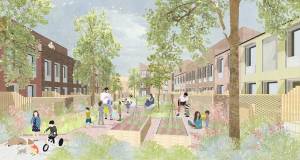 From Nero to zero
From Nero to zero -
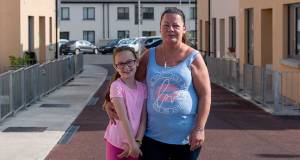 Measure everything
Measure everything -
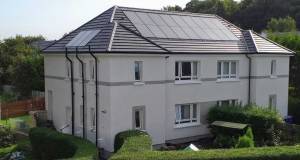 Renfrewshire aims for 3,500 whole-house deep retrofits
Renfrewshire aims for 3,500 whole-house deep retrofits -
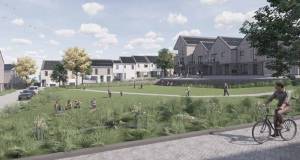 Welsh social housing to embrace passive house, timber & life cycle assessment
Welsh social housing to embrace passive house, timber & life cycle assessment -
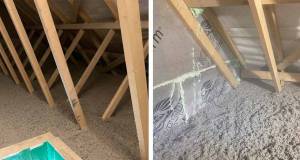 Ecocel on site with 56 homes in Cork
Ecocel on site with 56 homes in Cork -
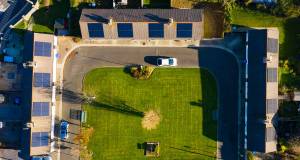 Senior college
Senior college -
 COP 26 & the future of the Glasgow tenements
COP 26 & the future of the Glasgow tenements -
 Is affordable housing a policy blind spot?
Is affordable housing a policy blind spot? -
 Government announces €45m for social housing retrofit
Government announces €45m for social housing retrofit -
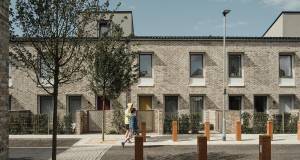 Stirling Work - The passive social housing scheme that won British architecture’s top award
Stirling Work - The passive social housing scheme that won British architecture’s top award -
 Higher costs, less benefits - Why the enhanced social housing leasing model is a bad deal
Higher costs, less benefits - Why the enhanced social housing leasing model is a bad deal

